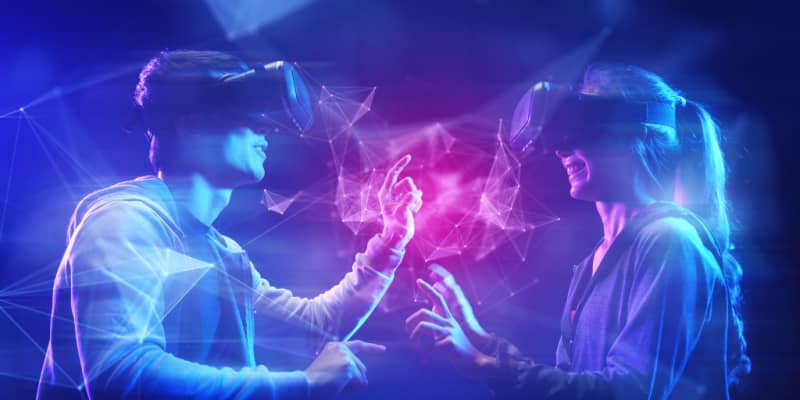
Is the metaverse a soap bubble or the foundation of the future? This question echoes through the tech conferences and internet forums as the metaverse goes through its erratic development journey.
The truth is, despite the heavily-opinionated skeptics, the metaverse has found in niche in the business environment. More and more enterprises look for the help of a metaverse development company to implement the technology to their benefit.
To reflect this steady growth, this article aims to demystify the metaverse’s real-world impact, focusing on the industry that’s riding the crest of this virtual wave, reshaping our reality in the process.
Gaming
Gaming has seamlessly transitioned into the metaverse, evolving beyond the screen to become a lived experience. Virtual and augmented reality technologies have given rise to immersive worlds where players exist and interact in real-time.
Platforms like VRChat and Fortnite have become more than games; they’re digital societies hosting concerts and social gatherings.
The economic landscape within these realms is equally dynamic, with in-game currencies and virtual goods creating a marketplace indistinguishable from reality.
This virtual economy is not play-money; it’s a burgeoning sector with real-world value, influencing markets and consumer behavior far beyond the digital frontier.
Entertainment and Media
The metaverse is revolutionizing entertainment, turning passive viewers into active participants. Content is no longer just watched but experienced, as virtual concerts and events draw millions into collaborative and immersive environments.
For instance, Travis Scott’s virtual performance in Fortnite blurred the lines between gaming and live music, attracting unprecedented crowds.
Beyond events, the metaverse redefines media creation and distribution, enabling artists to release content directly within these platforms.
This shift democratizes media production and opens up novel revenue streams and engagement models, fundamentally altering how we interact with the arts and entertainment.
Education and Training
The metaverse also transforms education, turning abstract concepts into immersive, interactive experiences. It’s a realm where students can dissect virtual frogs or walk through historical sites, enhancing engagement and retention.
Universities like MIT are pioneering this shift, integrating metaverse tech into their curricula, offering a glimpse into the future of remote learning. Virtual campuses in the metaverse break geographical barriers, allowing for global classrooms and diverse interactions.
As this technology matures, we’re seeing the dawn of a new pedagogical era where learning is limitless and the classroom is bound only by the imagination.
Healthcare
Healthcare in the metaverse is pioneering with virtual reality enhancing therapy and patient care. VR applications allow for innovative treatments, like exposure therapy for PTSD, by creating controlled yet realistic environments.
Medical training has been revolutionized as students practice surgeries and diagnostics in risk-free, simulated settings, vastly improving their skills.
Furthermore, the metaverse hosts support groups, offering a platform for patients to connect and share experiences more engagingly.
This digital leap in healthcare promises to improve patient outcomes and expand the reach of medical education and community support systems.
E-Commerce and Retail
E-commerce has embraced the metaverse, transforming shopping with virtual stores offering an immersive retail experience from home.
Augmented reality (AR) now allows consumers to ‘try before they buy,’ placing furniture in their homes or trying on clothes virtually, reducing returns and increasing satisfaction.
This digital shift also reshapes the supply chain, with product visualization tools streamlining design and manufacturing.
As retailers integrate metaverse technologies, the line between physical and virtual shopping blurs, creating a seamless, interactive consumer journey that redefines the traditional retail model.
Real Estate and Architecture
The metaverse redefines real estate, where virtual land sales are booming, and ownership extends into digital realms.
Architects leverage this virtual space for sophisticated design visualization, allowing clients to tour and modify structures before breaking any physical ground.
This digital domain’s real estate market is witnessing a surge, with platforms like Decentraland showcasing the lucrative potential of virtual property investments.
As these markets mature, they’re not just mirroring the physical world’s real estate dynamics but also creating new opportunities for investment, development, and community building within the expansive architecture of the metaverse.
Summing Up
The gaming industry is the vanguard of the metaverse revolution, showcasing profound changes from immersive gameplay to intricate virtual economies.
Yet, the ripple effect of the metaverse is just beginning. Industries from education to healthcare are catching the wave, exploring virtual spaces for training, treatment, and beyond. As the metaverse evolves, other sectors must reimagine their futures within its boundless horizons.
This digital evolution is not a question of ‘if’ but ‘when,’ promising a future where the metaverse’s role in industry transformation is as ubiquitous as the internet is today, heralding a new era of innovation and interaction.


